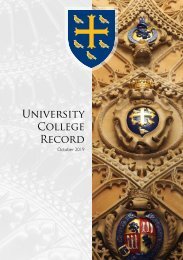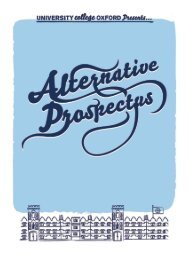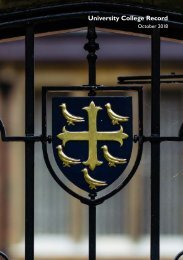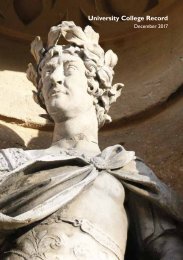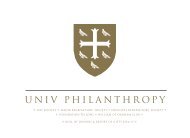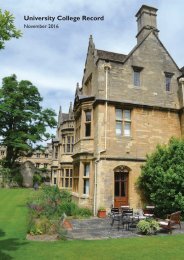University College Oxford Record 2020
Create successful ePaper yourself
Turn your PDF publications into a flip-book with our unique Google optimized e-Paper software.
The new University attracted a formidable field
and John obtained the coveted position. He
recounted telling Calvin the news and the great
man being puzzled why John did not try to delay
the move to York to stay another year in his
laboratory. But for John, there was no way he was
going to miss the first year of a new Department’s
life when decisions would be made which would
influence the way it would evolve. His decision
was of great importance, for he had the right mix
of great intelligence, a ferocious appetite for hard
work and an ability to work harmoniously with
all, from first year students to senior members
of the University. That combination enabled him
to give great service to his Department and the
University throughout his career.
John considered himself an organic chemist
but colleagues recognised him as a polymath.
His 179 research papers extended
beyond organic chemistry to include
catalysis as well as synthetic, inorganic,
physical, and analytical chemistry. John
described the linking theme between
his diverse research interests as
“mechanism” – how reactions occur.
He collaborated with many colleagues
and built up a reputation which industry
was keen to exploit. This led him to work
with a wide range of companies including
AstraZeneca, BP, GlaxoSmithKline, and Unilever.
He was frequently invited to give plenary lectures
at International Conferences and was sought
after as a visiting scientist, spending periods of
collaborative research in the USA and France.
A gifted teacher, John was known for his
good humour and easy manner. He was a very
popular research supervisor with 72 successful
DPhil and four MSc students. He is remembered
by his students not just for his intellect, but also
for the laughter over coffee breaks and the
friendly, supportive atmosphere he created in his
research group. Many stayed in touch with him
throughout his life and he took much pleasure
from their progress.
In retirement John travelled extensively to less
visited parts of the world, each journey being
planned with the same meticulous attention to
detail he had given to his research. His knowledge
and political understanding of the countries he
visited was immense, but it was the natural world
that interested him the most. Friends and family
remember John for this love of adventure, the
twinkle in his eye, his loyalty and his kindness.
Life was for hard work, exploration and having
fun. John was never a man to seek the limelight
for himself, but his intelligence, focus and quiet
determination took him far.
ROBERT NAPIER STOBER
(Solihull School) died on 23 April
2020 aged 81. His daughter Miranda
Nugent has kindly supplied this
tribute:
Robert was born one of four
boys in Birmingham in 1938 and
attended Solihull School. He came
up to read Classics at University
College in October 1958. He loved his
time at Oxford and was particularly inspired by
his philosophy teacher, the great Peter Strawson,
whom he spoke about often.
Robert remained passionate about Classics
throughout his life and read widely around its
disciplines. His unruly office was stuffed full of
articles and books and handwritten notes. He
went on to become a solicitor and worked at a
local firm in Whitchurch and Basingstoke, where he
became a partner and later on senior partner. He
University College Record | October 2020 77




